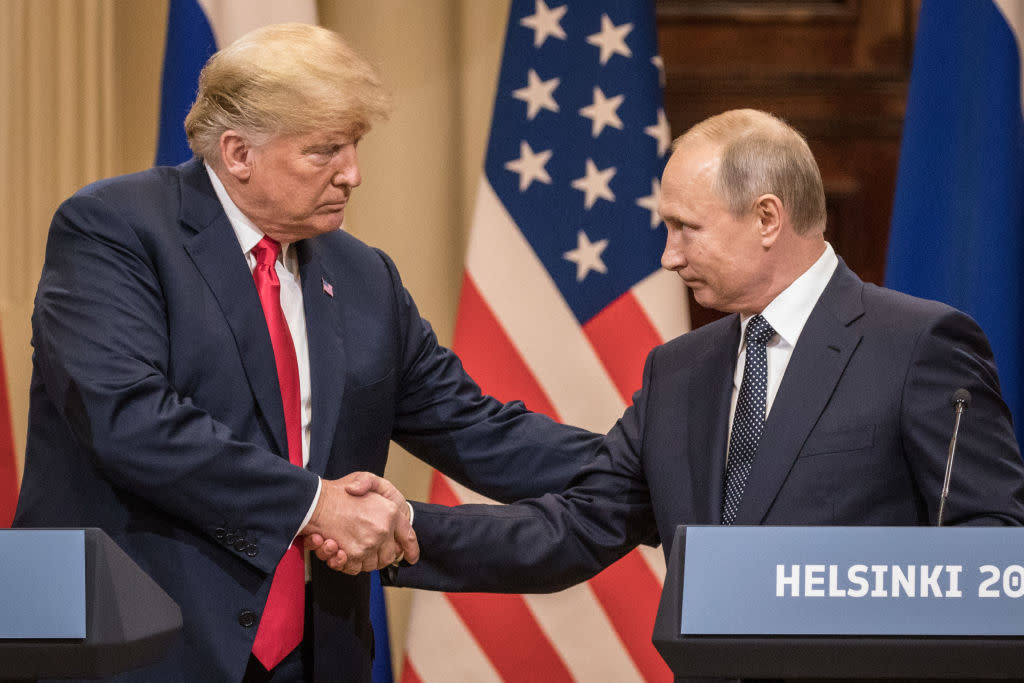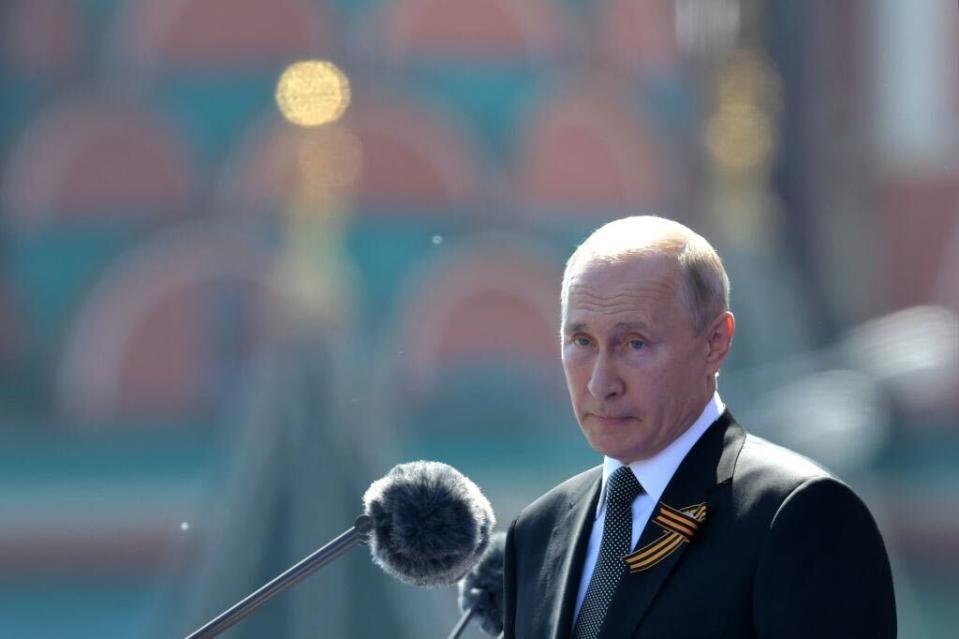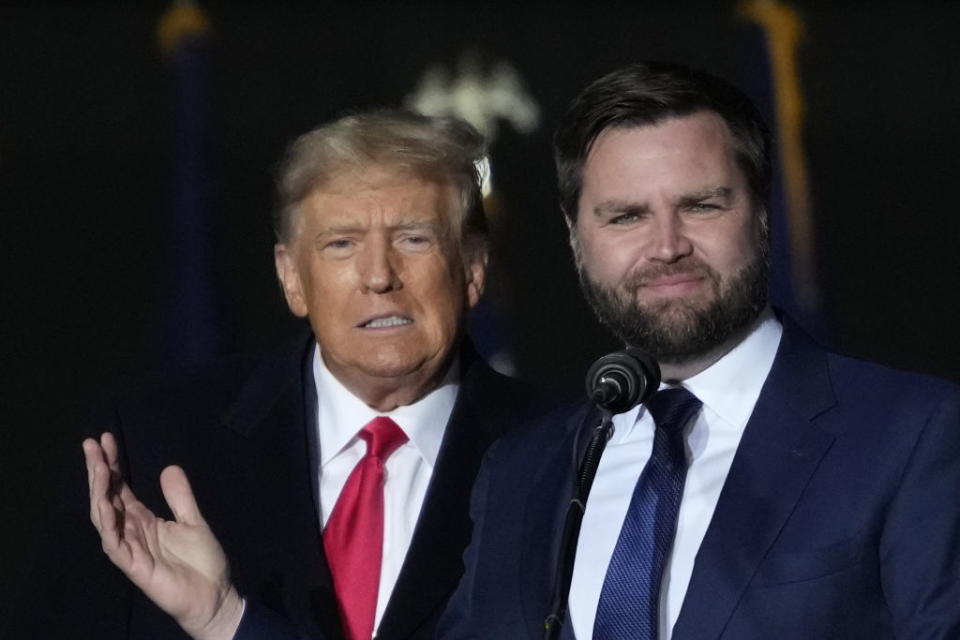Putin foe: Ohio’s Vance is repeating Kremlin talking points on sanctions

- Oops!Something went wrong.Please try again later.
- Oops!Something went wrong.Please try again later.
- Oops!Something went wrong.Please try again later.
Then-U.S. President Donald Trump (L) and Russian President Vladimir Putin shake hands during a joint press conference after their summit on July 16, 2018 in Helsinki, Finland. The two leaders met one-on-one and discussed a range of issues including Russia's 2016 U.S Election interference. (Photo by Chris McGrath/Getty Images.)
Few westerners know what a bad guy Vladimir Putin is better than Bill Browder — or what it’s like to get on the Russian autocrat’s bad side. And Browder says that Ohio U.S. Sen. J.D. Vance’s positions regarding Russia sound eerily like Putin’s own.
Browder is the co-founder of Hermitage Capital Management, and was declared a threat to Russian national security after taking on large Russian companies and exposing fraud and abuse.
Browder’s is an accusation that Vance — who is one of former President Donald Trump’s most likely choices as running mate — is reluctant to directly address.
Among his heartless acts, Putin banned Americans from adopting sick and disabled Russian orphans as revenge for legislation Browder championed allowing travel bans and asset seizures of Russian oligarchs who commit human rights abuses.
Browder pushed for the legislation after Putin’s government imprisoned his lawyer, Sergei Magnitsky, on trumped-up charges, tortured him, and beat him to death. The two had uncovered $230 million worth of tax fraud in Russia.
Putin’s bad acts are hardly limited to stealing from the Russian people, laundering the money around the world, and killing whistleblowers.
Russia also jailed prominent Americans on questionable grounds. They include WNBA star Brittney Griner and Wall Street Journal reporter Evan Gershkovich, who was hauled into the dock last week for a secret “trial” on allegations that he had engaged in espionage — charges the U.S. government strenuously disputes.
And Putin’s Russian opponents have a funny way of showing up dead.
Earlier this year, Alexei Navalny, Putin’s top political rival, died in priosn under suspicious circumstances. Last year, a plane carrying Yvegeny Pregozhin mysteriously crashed after he led a brief mutiny over the war in Ukraine. They were two in a long line of poisonings, beatings and incarcerations of those who dare challenge Putin or simply criticize him in the public square.
Putin also has cultivated ties with Iran, a state sponsor of terror, provided military support to Syria, whose dictator gassed his own people, and he’s cozied up to China, which scores abysmally on measures of individual freedom.
Putin helped Hungarian authoritarian Victor Orban rise to power, and he’s supported other anti-democratic leaders as he’s flooded disinformation into the politics of the United States, Britain, France, Germany, Italy, Spain and other nations.
And he invaded Ukraine on outlandish claims that the Russian army is fighting “Nazis” there.
Then in late June, Putin signed a mutual-defense pact with North Korea, creating an opening for Russia to give dictator Kim Jung Un technology that would enable him to land a nuclear weapon on the United States. That’s disturbing, especially when you consider that ours is a country Kim has suggested he would “thoroughly annihilate.”
Defining differences
Putin and his allies have something in common, Browder said. They all want to undermine democracy because it threatens their power.
“It’s absolutely what Vladimir Putin wants to do,” he said in an interview this spring. “But it’s not just Vladimir Putin. The Chinese want to do it, too. The Iranians want to do it. The North Koreans want to do it. Basically, we have this huge, open flank because we have free speech, liberal democracy, and opportunities to present opposing views.”
For his part, Vance concedes that Putin is a “bad guy.” But he’s adamantly opposed to U.S. support for Ukraine as it tries to resist Putin’s 2022 invasion. In February he said, “I’m much more interested in some of the problems in East Asia right now than I am in Europe.”
Vance also opposes the REPO Act, which would allow the United States to seize Russian government assets here and use them to support Ukraine. When Vance said it could have “dire consequences” for the West, Browder accused Vance of parroting Putin’s line.
“When I worked on the Magnitsky Act in 2012, it passed the Senate 92-4,” Browder posted on X in April. “I joked afterwards that ‘there was no pro Putin torture-and-murder lobby in Washington.’ I’m afraid to say that times have changed. Senator JD Vance is now parroting Putin’s exact words claiming that seizing Russian frozen assets would lead to catastrophe. Not only is he plain wrong, but we have to question his motivations. I sincerely hope that no one gives him any currency in advance of the vote on the REPO Act on Saturday.”
Asked repeatedly to comment on the accusation, Vance’s office declined to respond on the record.
The junior senator from Ohio’s commitment to democracy raises questions of its own.
Vance has said that if he was in Mike Pence’s position on Jan. 6, 2020, he would have delayed certifying the election — an act that would have thrown the nation into chaos and cast our democracy into doubt.
You can’t have a democracy unless both sides say they’ll accept the result of an election. But all Vance will say about the coming November election is that he’ll respect the result only “if we have a free and fair election.”
Just as in 2020, if Trump loses again, he and his allies seem certain to flood the zone with false claims of election fraud.
Bitter history
Browder’s conflicts with Putin stretch back to the 2000s, when Browder’s hedge fund was embarrassing the power in Russia by identifying massive corruption and the undervalued assets it created. In 2008, he, Magnitsky and the rest of his team at Hermitage Capital Management identified $230 million that had been stolen from the Russian treasury by government officials.
Their earlier work had already angered Putin, and Browder had worked to get his people out of Russia. Magnitsky refused, believing that Russia was changing for the better and he wanted to stay and help it along, Browder says in his book “Red Notice.”
A little more than a month after exposing the $230 million theft, Magnitsky was arrested on charges that he supposedly evaded paying taxes in the same amount as the stolen money. Through 11 months in pre-trial detention, Magnitsky was denied medical care, tortured and then beaten to death, Browder writes.
Browder was later tried in absentia — and Magnitsky after death. A Russian court convicted them of tax evasion. It was the first posthumous trial in memory, and the irregularity of the proceeding says something about Russia’s commitment to the rule of law.
The experience converted Browder from hedge fund manager to human rights activist.
Through the following years he fought for — and Congress in 2012 passed — the Magnitsky Act. It gave the U.S. government the power to place travel bans on Russian oligarchs who commit human rights abuses and to freeze assets they have here.
Not satisfied with that, Browder and others worked to extend the U.S. law to cover bad actors in other countries, and it became the Global Magnitsky Sanctions Program. They also got Canada, the UK, Australia and the European Union to pass Magnitsky laws of their own. The idea was that monsters would no longer be free to ruin their own countries and keep and enjoy the spoils in places that weren’t spoiled because they had democracy and the actual rule of law.
For that work, Browder last month was knighted by King Charles.
Rage
Putin hated the Magnitsky laws and his motives weren’t hard to guess. Browder’s group and others who investigated international money laundering discerned that Putin himself had plundered Russia, ordered underlings to move vast amounts through innumerable shell companies and park it in places outside Russia where they thought it would be safe.
Putin’s net worth is unknown, but it’s been estimated to be as high as $200 billion, which would make him one of the richest men in the world. Control of such wealth would cement a leader’s power in a country like Russia, which is ranked among the most corrupt in the world.
“Russia is a kleptocracy, in which President Vladimir Putin’s regime allows elites and oligarchs to skim from Russia’s private and public companies, benefit from reduced competition, and siphon funds from the state as part of elite patronage,” the U.S. Treasury Department said last year. It added that estimates of Russian wealth hidden abroad run as high as $1 trillion, and that a quarter of it is controlled by Putin and his close associates.
So it’s not surprising that Putin was furious at a law that threatened to take much of that money away. Perversely, he reacted by banning adoptions of Russian children by American families.
“It was truly evil because orphans being adopted were the sick ones, the ones with Down Syndrome and HIV and so on,” Browder said. “He was effectively sentencing his own orphans to death in Russian orphanages, as opposed to allowing them to be adopted by Americans who could give them a proper chance at life.”
However that may be, it became a convenient talking point when Trump and his family discussed undermining the Magnitsky Act with Putin and Russian agents .
In 2016 emails and at a Trump Tower meeting between Donald Trump Jr. and Russian operatives, a deal was discussed: dirt on Hillary Clinton from the Russians in exchange for a U.S. repeal of the law, or at least its non-enforcement. But the misleading cover story dictated by Trump was that the parties were there to discuss adoption.
Whose side?
Putin’s hostility reached a peak in 2018 when he shared a Helsinki stage with then-President Trump. Trump shocked the world by agreeing with Putin and rejecting his own government’s conclusion that Russia meddled in the 2016 election on Trump’s behalf.
For his part, Putin proposed that Trump hand over Browder in exchange for a dozen Russians charged in Special Counsel Robert Muller’s investigation into 2016 election interference. Trump further shocked the world by calling it an “incredible offer.”
It took five days and a unanimous resolution by the U.S. Senate to convince Trump that the offer wasn’t so incredible, after all, and back down. For Browder, who had by then become a British citizen but was vacationing in the United States, they were five days of worrying that he’d be delivered into the not-so-merciful clutches of Vladimir Putin.
“It wasn’t unexpected for Putin to ask for me, because he’s done that before,” Browder said. “I’ve been on Putin’s hit list ever since the Magnitsky Act was passed. He’s used Interpol eight times to have me arrested, he chased me around with death threats, kidnapping threats, he’s mentioned my name publicly on a number of occasions. So that was expected. Not pleasant, but expected. It was totally unexpected for Trump to agree to it.”
REPO
Now, as Vance is trying to persuade Trump to pick him as his vice presidential nominee, he is vocally opposing a successor to the Magnitsky law. It’s known as the Rebuilding Economic Prosperity and Opportunity for Ukrainians (or REPO) Act.
Introduced by Republicans in the House and Senate, it would allow the U.S. government to seize some part of $300 billion in frozen Russian government assets in the United States and send it to Ukraine to support the country in its fight against Putin’s invasion. That might seem only fair, given that Russia has imposed the expense of the war on others through Putin’s decision to invade.
President Joe Biden signed the bill alongside an award $61 billion in American support for Ukraine’s defense.
But just as he opposes using U.S. money to support beleaguered Ukraine, Vance is against using this mechanism to provide Russian money to the country Russia is attacking.
He warned colleagues of “dire consequences” and noted that this is the first time the United States has taken an action against a country with which it is not at war.
Some observers say the law carries risks if it’s not used judiciously and through a well-planned international framework. And it appears money won’t flow from it to Ukraine any time soon.
For his part, Vance argued that such action might steer many players to park their assets in places such as China and Russia, which seek to replace the United States as banker to the world.
However, there are real questions about whether authoritarian governments — especially highly corrupt ones — will bow to international standards required for people and businesses to trust those countries with their money.
Vance said the consequences of the REPO Act threatened to “upend the global financial order.” Speaking about it in such hyperbolic terms sounds a bit like Kremlin spokesman Dmitry Peskov, who said it was “nothing less than the demolition of all the foundations of the economic system.”
It’s use of such of language that prompted Browder to accuse Vance of parroting Russian propaganda.
“I can’t get into why (Vance is) doing it or where it comes from,” Browder said. “All I can do is comment on what he’s doing. What he’s doing is totally consistent with what the Kremlin is doing. The Kremlin wants the U.S. to cut off funding for Ukraine. And the Kremlin wants to keep (assets from being seized) and not have it go to Ukraine. For whatever reason (Vance) has it, it seems to be a totally pro-Putin, pro-Kremlin position. And it’s against the interests of the United States of America.”
GET THE MORNING HEADLINES DELIVERED TO YOUR INBOX SUPPORT NEWS YOU TRUST.
The post Putin foe: Ohio’s Vance is repeating Kremlin talking points on sanctions appeared first on Ohio Capital Journal.




